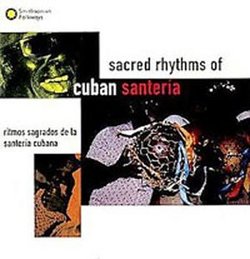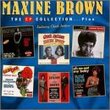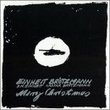| All Artists: Various Artists Title: Sacred Rhythms of Cuban Santeria Members Wishing: 1 Total Copies: 0 Label: Smithsonian Folkways Original Release Date: 8/11/1995 Re-Release Date: 8/22/1995 Genres: International Music, Pop, Latin Music Styles: Caribbean & Cuba, Cuba, Latin Pop Number of Discs: 1 SwapaCD Credits: 1 UPC: 093074041925 |
Search - Various Artists :: Sacred Rhythms of Cuban Santeria
 | Various Artists Sacred Rhythms of Cuban Santeria Genres: International Music, Pop, Latin Music
These recordings of Santería drumming and singing rituals feature four Cuban Santería groups calling the gods (orishas) by performing rythmic sequences called orus. Recorded in the Cuban provinces of Matanzas and... more » |
Larger Image |
CD DetailsSynopsis
Album Description These recordings of Santería drumming and singing rituals feature four Cuban Santería groups calling the gods (orishas) by performing rythmic sequences called orus. Recorded in the Cuban provinces of Matanzas and Havana City in 1983?1984, these ceremonies and drums have their roots in the ancient Yoruba religion of Africa and are rarely heard outside of Cuba. Notes in English and Spanish. 24 tracks. "A music at once raw and elegant, powerful and subtle." ?Miami Herald Estas grabaciones, que registran rituales de tambores y cantos de Santería, muestran las interpretaciones de cuatro grupos de Santería cubana en el evento de convocar a los dioses (orishas) a través de secuencias rítmicas llamadas orus. Estas ceremonias, grabadas en la provincia cubana de Matanzas y en La Habana en 1983 ? 1984, tienen sus orígenes en la antigua religión Yoruba del África y son raramente conocidas fuera de Cuba. Notas en español e inglés, 24 cortes. " Una música a la vez rústica y elegante, poderosa y sutil." ? Miami Herald Similar CDs
Similarly Requested CDs
|
CD ReviewsOUTSTANDING!!!!!!!!!!!! 08/12/1998 (5 out of 5 stars) "Being an initiate of the religon....I can fully appreciate the music and it's essence. I currently live in Iowa, this my little piece of heaven. ASHE' to everyone!" Music for Ritual Use 11/18/2000 (4 out of 5 stars) "The liner notes which are written in Spanish do not provide a person who is not familiar with Santeria with enough details. The intiates in the various houses of worship are secretive about thier specific rituals. Because the "Seven Powers of Africa," are well known in Cuba outside of the Lukumi devotees, the music is offered as a type of ethnomusicology recording for outsiders.If you are working with a specific Orisha in front of your Altar put this CD on and chant with the sacred drummers. This CD can aid worshipers in asking the spirits to come down. It is like a Gospel record for a Baptist." Straight from the source - invaluable matchu@mediaone.net | los angeles | 06/15/2000 (5 out of 5 stars) "This cd is an invaluable resource for those interested in the rhythm and song traditions of cuban santeria. A collection of field recordings documenting cojuntos in matanzas and havana. This cd is raw but authentic."
|

 Track Listings (24) - Disc #1
Track Listings (24) - Disc #1




